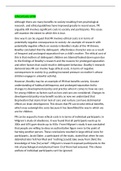Essay
Psychology: Controversies: Ethical Costs of Psychological Research
- Institution
- WJEC
A fully written essay arguing the ethical costs of conducting psychological research on individual participants and wider society as a whole. Essay argues the ethical benefits and drawbacks. Worth 24/25
[Show more]



